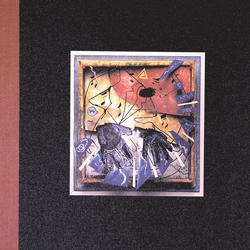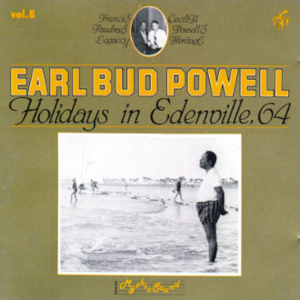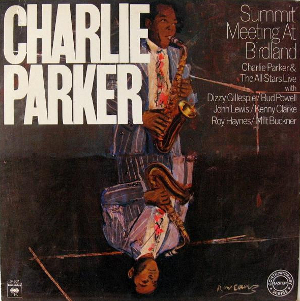
Earl Rudolph "Bud" Powell was an American jazz pianist and composer. A pioneer in the development of bebop and its associated contributions to jazz theory, Powell's application of complex phrasing to the piano influenced both his contemporaries and later pianists including Walter Davis Jr., Toshiko Akiyoshi, and Barry Harris.

Coleman Randolph Hawkins, nicknamed "Hawk" and sometimes "Bean", was an American jazz tenor saxophonist. One of the first prominent jazz musicians on his instrument, as Joachim E. Berendt explained: "there were some tenor players before him, but the instrument was not an acknowledged jazz horn". Hawkins biographer John Chilton described the prevalent styles of tenor saxophone solos prior to Hawkins as "mooing" and "rubbery belches". Hawkins denied being first and noted his contemporaries Happy Caldwell, Stump Evans, and Prince Robinson, although he was the first to tailor his method of improvisation to the saxophone rather than imitate the techniques of the clarinet. Hawkins' virtuosic, arpeggiated approach to improvisation, with his characteristic rich, emotional, and vibrato-laden tonal style, was the main influence on a generation of tenor players that included Chu Berry, Charlie Barnet, Tex Beneke, Ben Webster, Vido Musso, Herschel Evans, Buddy Tate, and Don Byas, and through them the later tenormen, Arnett Cobb, Illinois Jacquet, Flip Phillips, Ike Quebec, Al Sears, Paul Gonsalves, and Lucky Thompson. While Hawkins became known with swing music during the big band era, he had a role in the development of bebop in the 1940s.

Oscar Pettiford was an American jazz double bassist and composer. He was one of the earliest musicians to work in the bebop idiom.

Eli "Lucky" Thompson was an American jazz tenor and soprano saxophonist whose playing combined elements of swing and bebop. Although John Coltrane usually receives the most credit for bringing the soprano saxophone out of obsolescence in the early 1960s, Thompson embraced the instrument earlier than Coltrane.

Kenneth Clarke Spearman, known professionally as Kenny Clarke and nicknamed Klook, was an American jazz drummer and bandleader. A major innovator of the bebop style of drumming, he pioneered the use of the ride cymbal to keep time rather than the hi-hat, along with the use of the bass drum for irregular accents.
Debut Records was an American jazz record company and label founded in 1952 by bassist Charles Mingus, his wife Celia, and drummer Max Roach.

Jazz at Massey Hall is a live album released in December 1953 by jazz combo The Quintet through Debut Records. It was recorded on 15 May 1953 at Massey Hall in Toronto, Canada. Credited to "the Quintet", the jazz group was composed of five leading "modern" players of the day: Dizzy Gillespie, Charlie Parker, Bud Powell, Charles Mingus, and Max Roach. It was the only time that the five musicians recorded together as a unit, and it was the last recorded meeting of Parker and Gillespie.

Amsterdam Concert is a rare live Miles Davis recording from 1957. This album was recorded at the Concertgebouw in Amsterdam on December 8, 1957, a couple of days after the recording of the movie soundtrack Ascenseur pour l'échafaud. Davis recorded the album with drummer Kenny Clarke and three French musicians: Pierre Michelot on bass, Rene Urtreger on piano, and Barney Wilen on tenor saxophone.

The Amazing Bud Powell is a ten-inch LP by American jazz pianist Bud Powell, recorded on August 8, 1949, and May 1, 1951, and released on Blue Note in April 1952. In the first session, Powell performed in quintet with Fats Navarro, Sonny Rollins, Tommy Potter and Roy Haynes, and in trio with Potter and Haynes. In the second, Powell performed in trio with Curley Russell and Max Roach, and solo.

Groovin' High is a 1955 compilation album of studio sessions by jazz composer and trumpeter Dizzy Gillespie. The Rough Guide to Jazz describes the album as "some of the key bebop small-group and big band recordings."

The Complete Bud Powell on Verve is a five-disc box set, released on September 27, 1994, by Verve Records, containing all of jazz pianist Bud Powell's recordings as leader for producer Norman Granz.

A Tribute to Cannonball is a studio album by jazz pianist Bud Powell and tenor saxophonist Don Byas, released on Columbia in March 1979, featuring a session recorded at the Studio Charlot in Paris on 15 December 1961, with Pierre Michelot on bass and Kenny Clarke on drums, and trumpeter Idrees Sulieman guesting on four tracks. The session was produced by Cannonball Adderley, who would also produce Powell's follow-up A Portrait of Thelonious recorded two days later.

Bohemia After Dark is an album by jazz drummer Kenny Clarke, featuring the earliest recordings with Cannonball Adderley and Nat Adderley. It was released by Savoy Records in September 1955.

Presenting Cannonball is the 1955 debut album by jazz saxophonist Cannonball Adderley, released on the Savoy label, featuring a quintet with Nat Adderley, Hank Jones, Paul Chambers, and Kenny Clarke. A 1994 Japanese CD release also included alternate takes of tracks from Adderley's recording debut previously released as Kenny Clarke's Bohemia After Dark (1955).

Here Is Phineas is the debut album by American jazz pianist Phineas Newborn Jr. recorded in May 1956 and released on the Atlantic label in August 1956.

Rainbow Mist is an album by the American jazz saxophonist Coleman Hawkins compiling recordings from 1944 originally released by Apollo Records that was released by the Delmark label in 1992.

Inner Fires is a live album by jazz pianist Bud Powell recorded at Club Kavakos in 1953. Also appearing on the record were bassist Charles Mingus and drummer Roy Haynes. Some releases of the album include recordings of interviews with Powell from 1963, during his stay at the Bouffémount Sanatorium in France.

'Round About Midnight at the Blue Note is a 1962 live album by Bud Powell and his Three Bosses Trio, with Pierre Michelot on bass and Kenny Clarke on drums, that was released in 1994 by Dreyfus Records. According to Allmusic, the album was recorded in 1962, but ESP-Disk and The Penguin Guide to Jazz dated the recording as 1961.

Holidays in Edenville, 64, also known as Earl Bud Powell, Vol. 8, is a live album by jazz pianist Bud Powell and saxophone player Johnny Griffin recorded in Jullouville, France and released on Francis Paudras' Mythic Sound label. Recordings from the hotel gig, which ran for several nights in August, were also used on the albums Hot House, Salt Peanuts, and on one release of Blues for Bouffemont.

Summit Meeting at Birdland is a live album by alto saxophonist Charlie Parker recorded at Birdland in New York City in 1951 and 1953. It was released by Columbia Records in 1977.



















